
|
Walter Feuerhake
* 1915/05/20, Neustadt Springe, Germany |
Preface
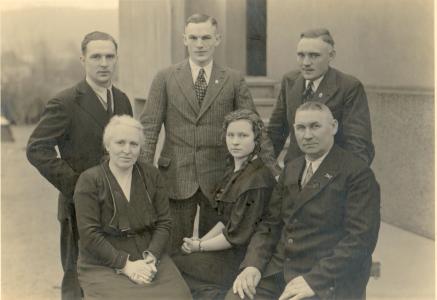 This is a page to help remember Walter Feuerhake. My name is Joerg Feuerhake. I am Walter's grandson. Since grandpa was born in 1915 his life was mainly traumatized by world war II. Though he desperately wanted to become a joiner and carpenter and wanted to run his own business he spent his entire youth, up to his 30th year in armed service, because he was ordered to by the government. He always told a lot of stories about war time they very often came with a sentence which, in my eyes became his motto: I do not wish upon my fiercest enemy, what i have been through. Since he repeated most of the stories lots and lots in different contexts and from different points of view i consider them true and will tell them here.
This is a page to help remember Walter Feuerhake. My name is Joerg Feuerhake. I am Walter's grandson. Since grandpa was born in 1915 his life was mainly traumatized by world war II. Though he desperately wanted to become a joiner and carpenter and wanted to run his own business he spent his entire youth, up to his 30th year in armed service, because he was ordered to by the government. He always told a lot of stories about war time they very often came with a sentence which, in my eyes became his motto: I do not wish upon my fiercest enemy, what i have been through. Since he repeated most of the stories lots and lots in different contexts and from different points of view i consider them true and will tell them here.
To point out again what Walter thought about his time as member of the German Wehrmacht consider the following: Walter went blind when he was 77. Since he couldn't hear a lot as well he was mainly cut off all human activity. He considered this handicap as 'the lord striking at him because he killed so many people'.
At last one can state that Walter in fact was an honourable man at least for following his plan to become joiner and carpenter, raising his daughter, being a loving father, husband and a respected joiner and carpenter... ...as he always wanted to.
Places and Times
I consider it important to have a short outline of Walter's life. I kept this part quite short. Dates are not given accurately. That won't harm a general understanding of his life.
'Prewar Career'
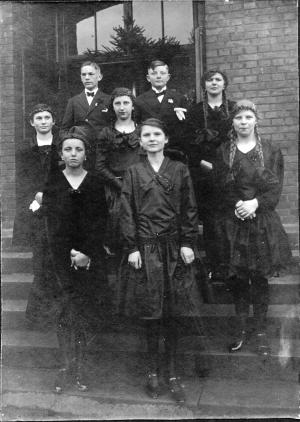 This following gives a short outline of Walter Feuerhake's pre war carrer. Since he was determined to become a joiner and carpenter he did a four years apprenticeship enabling him to go either into the furniture business as well as to the constructionsite business. in '36 war becomes tangible for Walter the first time.
This following gives a short outline of Walter Feuerhake's pre war carrer. Since he was determined to become a joiner and carpenter he did a four years apprenticeship enabling him to go either into the furniture business as well as to the constructionsite business. in '36 war becomes tangible for Walter the first time.
- 20. May 1915
- born in Neustadt Springe Germany
- 1922 - 1930
- attended school in Springe
- 1930 - 1934
- apprenticeship/becomes a joiner and carpenter in Springe
- 1935 - 1936
- 'Reichsarbeitsdienst' - compulsory service for young man at this time, mainly military preparation with a shovel instead of a gun (don't know where)
'War Career'
This paragraph gives an outline about the whereabouts of Walter during active armed service. Again I'd like to state his motto: I do not wish my fiercest enemy, what i have been through. Walter did 'ex post' not consider this time fighting for Volk and Vaterland but rather as trying to get one's derrier home without perforation. Remember: Walter was determined to become a joiner and carpenter and run his own business.
- 1937 - 1939
- Gallwitzkaserne Hildesheim I./Artillerie Regiment 55, compulsory service for young man at this time
- 1939 - 1940
- I./Artillerie Regiment 55 campaign, compulsory service under martial law, Poland, three weeks without sleep
- 1940 - 1941/~42
- I./Artillerie Regiment 55 campaign, compulsory service under martial law, Netherlands/Belgium/France, went all the way to Paris
- ~1941 - 1945
- Panzer-Artillerie-Regiment "Grossdeutschland", compulsory service under martial law, Soviet Union, fought mainly in the region of Poltava and Dnjeprpetrovsk, when putting in 'reverse gear' the went fighting via Schlesia and crossed the Neiße at the Town of Guben and was captured by the british somehow and somewhere in northern germany.
'Postwar Career'
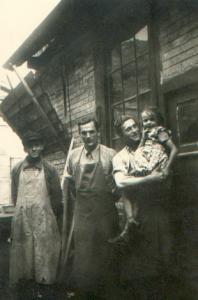
- 1945
- prisoner of war, in a british camp, refer to the history of "Grossdeutschland"
- 1945 - 1946
- as a craftsman Walter was released very early, came to Bühne married Hildegard Schulze, became 'Meister' of carpentry and opened his own business.
- 1946 - 1959
- birth of his only daughter 'Dorothea' in 1949, ran his business with three apprentices, who stood in contact with him for his whole life
- 1960
- Walter had to close down his business, Walters war injuries forced him to
- 1960-1986
- Driver at the 'Zuckerfabrik Osterwiek'
Prewarstories
The following are stories that happened before World War II. I could not verify them but I believe they are true for they've been told more than 'repeatedly '.
Boxing the Butcher's Son
In the late 20ties, early 30ties German politics was mainly characterized by one mean. violence. The fascist 'Sturm Abteilung' as well as communist and social democrat groups were fighting for the hegemony on the streets. In this time Walter had trouble with an SA leader in Springe. I don't know for what good reason. I guess there was some pub argument of 'political opponents'. Nobody really liked the SA leader because nobody really liked the SA. The SA were mainly a bunch of guys storming into clubs and pubs beating up the guests.
Anyway. The SA leader was the son of a butcher and had some reputation and had fought some fights already. So the evening came. The referee asked them to shake hands. This was replied by the SA man with: You'll lay here soon. Walter was scared but still answered, 'let's see who's off his feet when the fat lady sings.'
Well, Walter received some heavy blows but could land a lucky punch. The SA leader went not only against the ropes, limiting the ring but fell over them. Grandpa always claimed that he landed in a iron tub receiving some additional cuts and bruises. Afterwards he was asked by some 'talent scouts' to fight professionally. He had to deny the offer because he already was drafted.
'High Bars'
This is just a little funny. Walters favourite sport was Geräteturnen ('aparatus gymnastics'). On on tournament the had build high bars for competition. Walters coach went to check the device and found it was build not very firmly. So he went to Walter and told him, he should go to the high bars as the first of the team and he should heavily hang in there.
Walter did so. The whole device broke to pieces and Walter got scene applause. Walter always told this story to emphasize his physical strength, which helped him through the war. This story was always followed by some war-time story.
Renaissance Furniture
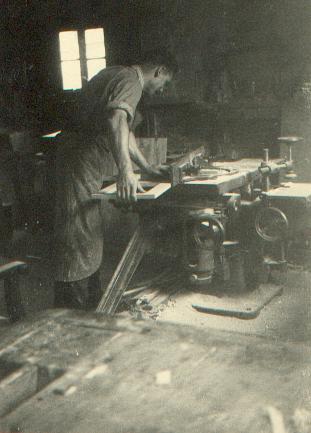
Some of Walter's biggest sources of pre war stories are the making of a renaissance room in the joiner and carpenter's workshop he was apprentice in. He especially liked this one: when the whole thing with bed, mirror, bookshelf and wardrobe was assembled some finishing was then done. Among it Walter had to blow dust into the carved edges to make it look old. Walter thought even further. He took a small drill and went to the wardrobe. The master asked 'What's this going to be?'. Walter answered he just wanted to drill some holes in it to make it look as if wood worms would live there. He immediately received a 'set of hot ears'...
Second renaissance story dates a little later. The whole thing was delivered and assembled in the rooms of the very well-off customer. What happened is something every joiner and carpenter knows. The air humidity and room temperature is different and the whole construction starts 'working'. Result: The doors do not close properly and the drawer makes weirdo noises. So, they send the apprentice to fix the problems. What he did was drive a wedge under the wardrobe on the back side and wax the drawers with a candle. Walter always said: if you need to fix things at the customers place take a candle with you. The point came where he received a tip of 20 Mark which was half his monthly salary as an apprentice. He was king of the pub the following nights.
Wartime Stories
This next paragraph shall be introduced with one of Walters 'bon mots'. It is a little indecent so if you are easy to insult please skip right to the next headline: 'I know what starving is. If one would shit on my pan cake, I'd cut off the margin'
Furthermore, the next paragraph comes with no pictures. At first because I have none and at second to make sure the whole page does not look like a Landser-Heft.
Behind the Fence, Into the Gutter
In Walters eyes 'good luck' was the most important thing when trying to survive. When they where already on German soil again, near Guben, his comrades where in a house getting ready to march off. He was outside already carrying a heavy machine gun. He noticed a guy aiming at him from behind a fence 50 to 100 metres away. He rose the gun and triggered at once. The blow of the gun threw him at the wall of the house behind him. The guy behind the fence died. But his shot went off while he fell, hitting the gutter right above Walter.
'It could well have been the other way round.' Walter used to say.
Buried Alive
Walters unit lay dug in. He stood with a commander. The commander was a youngster. More medals then days in the field Walter would have said. Walter noticed a light artillery blow 200 metres to the right of them. Half a minute later he noticed a blew about 200 metres to the left of them. Walter thought: 'Wait they aim at us! They do 'einscheren' ('to scissor in', that means you deliberately fire left and right besides the real target and by this experiment calculate precisely how much explosive you need and at what angles the cannon should point to). He could shout 'run for cover' but it was too late. The stand received a full blow. The fortification fell on the man in the stand. Walter couldn't tell how long he lay passed out. When he became concious he neither couldn't move, breathe nor see anything. He felt his American gun in his hand. He took it from someone who did not need it any more. For the lack of breathing he passed out. Again Walter could not tell for how long. When he became conscious the sand covering his right hand began to move. In fact he could move his hand. So he started digging towards his mouth. That worked after all. Eventually he managed to dig himself out of the sand. Walter remembered that when he actually got free he spent one hour trying to get his boots out of the dirt. He was totally in shock. He was found by a Red Cross truck still trying to rescue his boots. Now he realized that he had lost his voice completely due to the trauma I guess. The whole incident left Walter physically unwounded. Physically...
In the end a guy with an amphibian vehicle took him to the hospital cross the river Dnjepr. This very guy was killed by a sniper bullet when trying to turn back to his unit. 'The guys died like flies in these days' Walter often said.
When I lived in the fifth storage of an apartment block in the very late 1970ies, early 1980ies Walter was not able to take the elevator. He hated crowded or tight spaces. He could not take public transport during rush hour etc. etc.
Sunflowers
Wow that Russia is a damned mighty big land. While in the Ukraine he once tried to take a shortcut right through a sunflower field. Since Sunflowers are way bigger than a man he got lost for more than three days in just that one field.
Snowy Bumps
The unit lays fortified and cannot move because there are snowfalls. The snowfalls are not heavy but one cannot see through it. Next day snowfalls are over, the day is clear. Walter watches the plains in front and thinks 'wait!' something 's wrong here. He goes to the commander telling him that he feels that something 's wrong but he does not know what. It was just a certain feeling. The commender told him to calm down. Finally he allows Walter to have a look through the heavy scissors binocular. He may have a look to figure that everything is at its best. When Walter looked through the binocular he asked what the bumps in front could probably be? Have they been there when snowing started? The commander was not sure. Walter said:'I tell you what those bumps are. These are the Soviets. They have sneaked towards us while it was snowing and in one or two hours they will be here shouting 'Hurraa!'. His suspicion was true. His unit fired first so it where them who died this day.
Once more Walter used to say: 'It could have been the other way round' and 'God they spent a whole night and day covered with snow just to throw us out of the land, they fought fiercely, good lord.'
Wired Communications
Every artillery unit has an outpost close to the front. they figure out what targets are most 'valuable' and communicate the coordinates back to the unit. that was done by field telephone, so wired communication. The alimentation of the guys in the outpost was organised by the unit in the back. How? They sent a guy with the things needed and this guy would along the wire all the way to the outpost.
When this story happened the unit already lost two or three guys trying to reach the outpost. The man in the outpost ran short of food and water already. Since Walter was one of the most experienced in the unit they sent him to reach the outpost since they suspected an ambush somewhere on the track. Ok, Obergefreiter Feuerhake went off with the wire in his hand. He went through the woods at night. That means that one needed to drop the wire and then find it again in the dark. After some hours he reached a house and thought 'ok here we are'. He just wanted to shout the 'secret words' identifying him so that the post standing in the dark would not shoot him as a suspected enemy. The post just lighted a cigarette and for a second one could see the soviet uniform of the post. Walter sneaked back right away, thinking that the outpost was raided. When turning back he told the commander the outpost was captured. The commander replied that cannot be i have the guys on the phone. How can this be? The soviets used the same means of communication. What the soviet unit did in fact was lay their wire right across the German one. Walter's unit was the first to notice this 'coincidence' that already caused the death of two young men. Well, Walters unit figured out which house the Soviet outpost must be in and destroyed the whole building with one shot.
It could have been the other way round as well. By the way Walter spoke of the enemy with a lot of respect. 'The Russians fought fiercely, good lord' or 'We came to their country and they have thrown us out, heck, they did' Walter often said.
Field Kitchen Blast
One special thing about heavy cannons was that bullet and explosives are stored and loaded separately. The reasons where that it was easier to dose the amount of explosives needed to deliver the bullet over a certain distance. Anyway the explosives where stored in small sacks. When they got wet they became useless ... for the cannon not for the cook. Cause they served as a very good burning accelerator. You just take a wet sack of explosives, coals to set fire to and very few splinters of wood. Set fire to it and wait. Well, his 'heroes dead', as the announcement for his parents called it, was one of the most useless he had encountered. He went off with his field kitchen.
Casualties in Poland
Walter often referred to the Poland campaign (raid?) as the most exhausting campaign because they had to march for days and days without proper sleep. In his unit they had only very few enemy contact but still no sleep. They only 'casualty' they had was a guy who fell asleep on the back of his horse which was dragging a cannon. The cannon rolled over him. This was the very first time grandpa had to make a coffin.
Casualties in the Soviet Union
On the very first morning when they tried to cross a river they had six fallen unit members. Walter often said: 'when I saw the fierce anger which they welcomed us with I though this time it will be an augenblick different' augenblick: a blink of eye, a little bit.

Postwar Stories
Burying Thelma
First I'd like to point out the the name Thelma is not the real name of the person talked about. Walter's first field of business was the quite cycle proof business of making coffins. In the late forties early fifties it was part of his job to carry the 'customers' to the cemetery.
Poor Thelma died in a hospital about 40 kilometres from her village. Walter went with two helpers to fetch her and bring her back. The return was delayed three days. Then they returned on their horse dragged carriage. Thelma was in her coffin in the back. They had stopped at every pub from Wernigerode to the village. That made about 10 stops either way. Thelma's relatives were horribly disappointed.
Der Weihnachtsmann
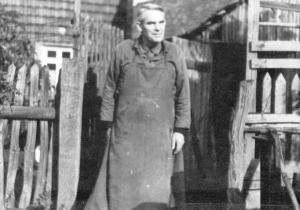
Imagine yourself in the midst of the cold war in a village on the 'wrong' side of the iron curtain. Not far from the border. The sight of armed uniformed man is common. You are the only joiner and carpenter in that village and therefore you receive a large fraction of your job from the mayor. Many farmers, especially those who owned lots of acres fled to the west. Among them was an old friend of your wife.
Your wife does not want to loose this friendship and therefore plans to visit her in the west. As an excuse she claims to visit your sister, who is living in the western part as well, when applying for the visa. Yes, one needed a visa to travel 50 kilometres to see ones closest relatives. The authorities denied approval stating that closer 'examination' led to the suspicion that she wanted to visit enemies of the state, the escaped farmer and his wife, and therefore could not be approved to go. Hm, they've been right actually.
Now, what would you do now? Walter acted as follows. He stopped all carpentry for the village and other public customers. Since his core business were coffins this was easy to do. Every time the mayor asked for his doors, window frames, whatever Walter replied: 'You know the deal. My wife wants to travel.' The mayor thought he could play tough and called for the inspector of the 'Arbeiter und Bauerninspektion'. This guy could close down your business and send you right behind bars if he found that you'd be an enemy of the new order.
Walter saw them coming down the street and went to the garden fence. He addressed the mayor ignoring the authority guy saying: 'You may either bring this guy or Santa Clause. You know the deal ... and do not dare to step on my property.'